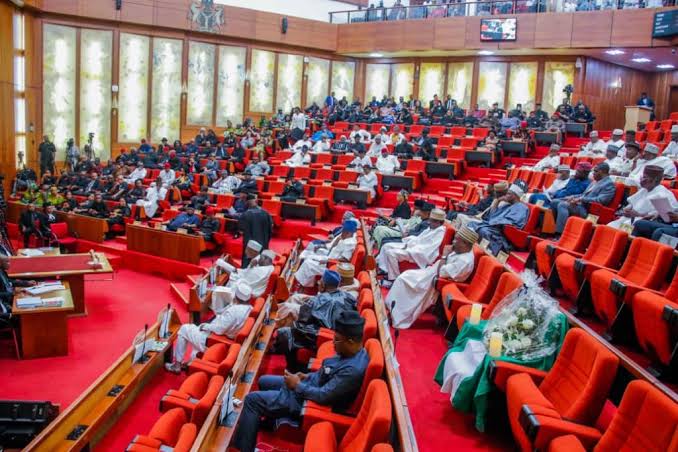News
NCDC Bill scales through second reading in Senate

The bill seeking the establishment of North Central Development Commission (NCDC), being sponsored by the senator representing Benue South Senatorial District and Senate Minority Leader, Comrade Abba Moro and co-sponsored by all the senators from North Central, on Wednesday, passed Second Reading on the floor of the senate.
The bill, which passed First Reading on the 5th of October, 2023, was first sponsored in the 9th Senate by Senator Moro where it passed First and Second Readings but could not get presidential assent before the expiration of the 9th Senate.
In his lead debate, the Senate Minority Leader said the Commission, when established would be saddled with the responsibility of receiving and managing funds from the federal government and donors for the resettlement, rehabilitation, integration and reconstruction of roads, houses and business premises of victims of flood and farmers/herders clashes, communal clashes, construction of large format drainage systems, dredging of rivers Niger and Benue to control flood and incidental matters, as well as tackling the menace of poverty, illiteracy and other related environmental or developmental challenges facing the North Central Nigeria.
The Lead debate reads;
“Mr. President, Distinguished colleagues.
“May I humbly seek your leave to lead the debate on this very important Bill.
“Mr. President, Distinguished Colleagues, the North Central Zone of Nigeria, in no particular order, comprises the following geopolitical States of the Federation; Kogi, Niger, Benue, Kwara, Plateau, Nasarawa and the Federal Capital Territory, Abuja.
“Over the past years, Mr. President, Distinguished Colleagues, the North Central Zone of Nigeria has been devastated and left in bollix by the noxious antics of terrorists, incidents of flood and erosion, insurgency, kidnapping, herder/farmer clashes, poverty, high rate of illiteracy, to mention but a few.
“The Zone is blessed with several mineral resources that can boost the economy of Nigeria if properly harnessed. However, because of the breeding aforementioned, the North Central Zone is handicapped and cannot do much in this regard.
“May I mention here, Mr. President, that the North Central Zone of Nigeria hosts two of West Africa’s great rivers;(a) The River Niger and (b) The River Benue, which flows into Nigeria from The Republic of Cameroon. The two rivers meet in North central Nigeria and flow as one river on to the Atlantic Ocean. However, the presence of these two rivers has made flood a perennial challenge in the region with increasing intensity every year, leaving not just the North Central Zone but the entire Country with great losses and trauma.
“Mr. President, Distinguished Colleagues, according to statistics from the Nigerian Meteorological Agency, In 2012 and very recently, devastating flooding forced two million Nigerians from their homes and over 363 people died in Plateau, Benue, Niger, Nasarawa and Kogi states.
“Between 2016 and 2023, more than 92,000 people were displaced and over 578 died from incidents of flood in Benue, Kogi, Niger and Nasarawa States, and other parts of Nigeria.
“Annually, Mr. President, Distinguished Colleagues, hundreds of thousands of acres of farmlands are damaged in the North Central Zone of Nigeria where the people are largely agrarian as a result of flood, and this happens, Mr. President, whenever there is a heavy precipitation upstream on the Benue and Niger Rivers. On the Benue River, the main problem is Lagdo Dam in Cameroon, which usually causes the river to swell when water is released. Flood has caused a lot of damage to the North Central Zone. In Agatu, Benue state, farmers continue to lose their crops and farmland to flood and erosion. This is applicable to states like Niger, Nasarawa and Plateau, which have suffered loses and trauma because of flood and erosion.
“Mr. President, Distinguished Colleagues, it is no longer news that over the years, herder/farmer clashes in North Central Nigeria, especially in Benue State, have continuously made headlines. Consequently, infrastructure ranging from places of worship, roads, hospitals, schools, houses, recreational centres, etc, have been left tattered, shattered and pierced by bullets. Women, children, pregnant women and in fact the entire population is a victim of the atrocities perpetrated by suspected herders and bandits in the North Central Zone of Nigeria. Even animals and the environment are not spared the chaos and conundrum imparted on the Zone by the perpetrators of these unwholesome acts.
“Mr President, Distinguished Colleagues, between February 24, 2016 and January 2024, rural dwellers in 45 villages of Agatu LGA were awakened by sound of gunshots and flicks of matchets as suspected militias swept into the area unleashing an orgy of violence. The unfortunate incident left, in its wake, more than 800 persons dead, among which were children and women, with more than 59,000 persons displaced from their ancestral homes. The displaced communities have been scattered with many seeking refuge in various Internally Displaced Persons (IDPs) camps scattered across Benue and Nasarawa states.
“Mr. President, Distinguished Colleagues, this Bill seeks, therefore, to; establish the North Central Development Commission (NCDC) saddled with the responsibility of receiving and managing funds allocated by the Federal Government and Donors (International and Local Donors) for the resettlement, rehabilitation, integration and reconstruction of roads, houses, farmlands and business premises affected by flood, erosion and farmer/herder clashes, terrorist activities, construction of large format drainage systems, dredging of rivers Benue and Niger to control flood, erosion and other incidental matters, as well as tackling the menace of poverty, illiteracy and other related environmental and developmental challenges in the North Central Nigeria.
“Mr President, Distinguished Colleagues, we all know the bond and attachment a man has with his ancestral home, and the psychological effects of being displaced from same. The funds allocated by the Federal Government and Donors (Local and International) will be used to rehabilitate displaced persons, and to indeminify them to their former economic status.
“Recent advocacy has centered on the need to make Nigeria’s geopolitical zones centers of development, as intervening centers of development between the states and the Federal government. It is our hope that the aggregate of developments via the instrument of Zonal Development commissions will make Nigeria stronger and greater again. Mr President, unbundling the federal government now has become an imperative need given the development inertia of most states and the near emasculation of local government councils in Nigeria.
“Mr. President, Distinguished Colleagues, may I mention that this Bill was actually initiated by my humble self in the 9th Senate , passed all necessary legislative processes and got a resounding support from every quarter of the nation. However, the Bill was unable to get to the presidency for further necessary action before the end of the 9th Senate.
“Today, Mr President, Distinguished Colleagues, in the 10th Senate this Bill is co-sponsored by all senators from North Central Zone across party lines.
“Mr. President, Distinguished Colleagues, I humbly urge you all to support this Bill for the Establishment of the North Central Development Commission (NCDC) and pass it appropriately for a second reading for equity, fairness and the development of our country.
“Thank you all for your kind audience.”
The Senate President, Senator Godswill Akpabio, in his remarks thanked Senator Moro and all the co-sponsors of the bill for sponsoring the all-important bill. He said development in any part of the country was development for all Nigerians. He agreed with the sponsors of the bill that North Central deserved a development commission to address the myriads of challenges confronting the region.
The bill was refered to the committee on Special Duties to report back to the Senate within four weeks.
News
SAD! Woman, child electrocuted in Edo

A 32-year-old woman has been reportedly electrocuted by a cable belonging to the Benin Electricity Distribution Company (BEDC).
The woman and her baby were said to be electrocuted to death by a cable beneath a flooded road she was walking on after a heavy downpour.
The incident was said to have occurred on May 7th, 2025 at the Oregbeni area of Benin City, Edo State capital.
The woman, identified as Sarah David, was said to have had her baby strapped on her back when the tragedy occurred.
The cable was said to have fallen from one of the electricity poles in the neighborhood.
An eyewitness who simply identified herself as Edugie said: “the woman was also walking with a toddler believed to be her eldest child when the tragedy struck.
But for a passer-by who quickly rescued the toddler from the water, the entire family would have been wiped out.
“But for a passer-by who quickly rescued the toddler from the water, the entire family would have been wiped out.
“After the incident, some residents in the area called on the authorities of the Benin Electricity Distribution company (BEDC) to interrupt electricity supply to the area after which the corpses were removed from the flooded area.
The incident occurred on May 7th, 2025 at the Oregbeni axis of the Benin-Agbor Road,” the witness stated.
The husband of the deceased woman, Mr Samuel Ibom David bemoaned the death of his wife and baby.
He appealed to members of the public to assist him with funds to pay his late wife bride price and enable him approach her family for proper burial.
The management of Benin Disco were yet to respond to the tragedy at the time of filing this report on Sunday evening.
News
10th House extraordinarily proactive, productive for two years – Speaker Abbas

The Speaker of the House of Representatives Hon. Abbas Tajudeen, has said the 10th House has been proactive and productive since its inauguration almost two years ago.
Speaker Abbas also noted that the Legislative Agenda of the 10th, with far-reaching and ambitious proposals and targets, has produced results.
The Speaker made this known in Abuja on Monday at the inaugural Policy Dialogue on the Legislative Agenda of the House, which had top government officials and organisations at the federal and state levels in attendance. The private sector and the diplomatic corps were also represented.
The event was organised by the Office of the Speaker in conjunction with the Policy and Legal Advocacy Centre (PLAC); the National Assembly Library Trust Fund (NALTF), and the UK International Development.
Speaker Abbas said: “Two years later, I am proud to report that these efforts have yielded results. In terms of legislative output, this House has been extraordinarily proactive and productive. We have introduced a record number of bills and a volume of legislative proposals that is unprecedented at this stage of any assembly.
“More important than quantity, however, is the impact: these bills and motions are geared towards the critical reforms our country urgently needs. Already, many of the significant bills that we passed have received presidential assent.”
The Speaker said the dialogue is “a clear demonstration of our shared effort to promote parliamentary accountability, transparency, and a truly citizen-driven legislature.”
While recalling how the 10th pledged to regularly engage with Nigerians, report on its performance, and adjust its course based on the people’s feedback, the Speaker noted that the dialogue is part of that promise, “serving as a precursor to the upcoming Open NASS Week, where we open our doors to scrutiny and present our midterm progress.”
Speaker Abbas emphasised that the goal of the event is not only to celebrate the House’s achievements but also to candidly examine areas for improvement in the spirit of openness and democratic inclusion. He said that as the House prepares to mark the midpoint of its tenure, it is significant to reflect on its journey so far.
He said: “When the 10th House was inaugurated in June 2023, Nigeria faced significant challenges. The economy was weak, and there were pressing development and security crises. The populace was understandably frustrated and lost hope in democracy’s ability to meet their aspirations. This was followed by the shock of the removal of fuel subsidies, which exacerbated economic hardships and increased public anxiety. We recognised that extraordinary times required an extraordinary response from the legislature.
“Therefore, from the onset, the House dedicated itself to creating and implementing the most ambitious legislative agenda in our history. Designed to deliver good governance, this agenda aims to restore hope in democracy for our people.”
Speaker Abbas pointed out that the Legislative Agenda was not crafted in isolation but a product of extensive consultations with key stakeholders, including ministries and agencies, civil society, and development partners. He recalled how the House produced a comprehensive roadmap to guide its law-making, oversight, and representation from 2023 to 2027.
The Speaker stressed that the House took special care to align its priorities with the ‘Renewed Hope Agenda’ of the President Bola Ahmed Tinubu-led administration, ensuring synergy between the legislative and executive arms of government.
“Thus, our agenda embodies collaborative governance by engaging in dialogue with the Executive. This approach allows us to fulfil our independent mandate while ensuring that our legislative actions support national objectives and address the pressing needs of our citizens,” he stated.
Speaker Abbas explained that the agenda encompasses eight broad priority areas that address Nigeria’s diverse needs. These include strengthening good governance, enhancing national security, revitalising the economy, reforming our laws, and promoting social development. It also advocates for inclusion through an open parliament, directs foreign policy in the national interest, and tackles climate and environmental sustainability.
He said: “Never has a House of Representatives set such an expansive and forward-looking legislative blueprint. The impact the 10th House has made thus far is largely due to the deliberate, strategic, and focused execution of this agenda. We have remained focused and resilient in pursuing these goals, even when unforeseen issues arose.
“We backed our plan with concrete implementation strategies. Each House committee integrated the agenda into its work plans; we established clear milestones and key performance indicators to track progress, and we set up special committees to monitor and evaluate how well we are meeting our targets.
“We also insisted on better communication and regular reporting, which included requiring members to maintain functional constituency offices and report on their engagement with the public, ensuring accountability at every step.”
He added: “Crucially, our agenda was designed with the flexibility to respond to emerging crises. This means that even as new challenges have arisen, we have adapted swiftly without losing sight of our long-term goals. In short, we did not simply announce an ambitious agenda and hope for the best; we put in place the mechanisms and political will to implement it.”
When it comes to representation, Speaker Abbas stated that the members have endeavoured to make the 10th House “a citizen-driven legislature in practice, not just in words.” He said: “In every major endeavour, we have actively sought the people’s voice.”
News
UK unions slam Govt’s decision to end care worker visas

Labour unions and stakeholders in the United Kingdom’s care sector have come out strongly against the government’s move to stop the recruitment of foreign care workers, describing it as a reckless policy that could cripple the already struggling industry.
According to The Guardian UK, the UK government is set to publish a new immigration white paper on Monday, which includes plans to ban the recruitment of care workers from abroad.
This move is part of broader efforts by the government to cut down on legal migration and shift focus to local labour.
The announcement has drawn sharp criticism from unions and industry leaders, who argue that the care sector — already battling manpower shortages and funding challenges — heavily depends on foreign workers to function.
Reacting to the development, Professor Martin Green, CEO of Care England, lamented that the government’s decision amounts to “kicking the sector while it’s already down.”
For years now, we’ve been surviving on limited resources, rising operational costs, and serious staffing gaps,” Green said. “International recruitment may not have solved all the problems, but it provided a much-needed lifeline.
Taking that away now without offering any support or alternative is simply heartless.”
The UK’s largest trade union, Unison, also condemned the policy and demanded immediate clarification on the fate of foreign care workers already in the country.
Unison General Secretary, Christina McAnea, noted that the UK’s healthcare and social care systems would have collapsed without the input of migrant workers.
“Thousands of migrant health and care workers have kept things running. Now, they are left confused and anxious about their future. The government needs to assure them they’ll not be kicked out,” she stated.
McAnea also criticised the government for tagging care roles as “low-skilled”, insisting that the sector deserves better pay and recognition.
Figures show that in 2023 alone, over 58,000 foreign care workers entered the UK through the skilled worker visa route — accounting for nearly half of new entrants into the care workforce.
Meanwhile, the Labour government has defended the decision, describing it as part of a reset of the immigration system designed to reduce dependency on foreign labour and invest in British workers.
Home Secretary Yvette Cooper, speaking during a BBC interview, insisted that there are still untapped pools of labour within the UK.
“Employers should be looking to hire from those already in the UK, including people on existing visas who are yet to be deployed,” she said. “There’s also room to extend some visas, but we believe it’s time to draw the curtain on recruiting new care workers from abroad.”
The policy continues to stir debate across the UK, with fears that it could worsen the staffing crisis in the care sector and increase pressure on families already struggling to access quality care services.
-

 News19 hours ago
News19 hours agoWho Is Usoro Akpabio? Tinubu’s New MD for South-South Development Commission
-

 News11 hours ago
News11 hours agoJust in: Wike admits Fubara alongside 2 govs visited him on reconciliatory moves
-

 Politics19 hours ago
Politics19 hours agoJust in: PDP leaders plan to grab power as govs, ex-govs meet
-

 Politics19 hours ago
Politics19 hours agoWatch moment Wike arrives for PDP meeting (Video)
-

 News14 hours ago
News14 hours agoRivers crisis: Wike’s aide mocks Fubara, advises him to honourably quit since his spirit has left Brick House
-

 News19 hours ago
News19 hours agoTrue confession: “I’m not keen to return to office my spirit has left Brick House-Fubara
-

 Economy13 hours ago
Economy13 hours agoSEE Black Market Dollar (USD) To Naira (NGN) Exchange Rate Today 12th May 2025
-

 News8 hours ago
News8 hours agoGo home to face corruption probe, protesters in London tell Kyari (Photos)






